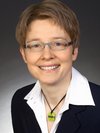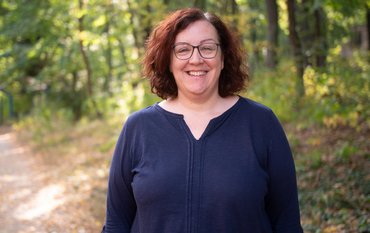The turn of the year is a time of change, so, too, in Potsdam. As of 1 January 2023, the IASS has been renamed as the Research Institute for Sustainability (RIFS) and embedded into the administrative structures of Helmholtz Centre Potsdam – GFZ German Research Centre for Geosciences, where it will conduct its research under the umbrella of the Helmholtz Association.
In the summer of 2021, the German government and the State of Brandenburg, the funders of the Institute for Advanced Sustainability Studies (IASS), reached an agreement to integrate the Institute into the Helmholtz Centre Potsdam – GFZ German Research Centre for Geosciences. Under the terms of this agreement, the Institute will become a part of the Helmholtz Association’s “Earth and Environment” research field and also engage with other research fields. This decision followed the report on the Institute’s evaluation by the German Council of Science and Humanities, published in April 2021, which acknowledged the Institute’s unique standing in Germany within the growing field of sustainability science.
In the wake of this decision, the GFZ and IASS developed a joint concept for the Institute’s integration and made preparations for its implementation. Their efforts have met with success: As of 1 January 2023, the IASS’s final period of project funding has concluded and the Institute is legally a part of the GFZ. This step will be accompanied by the liquidation of the public association behind the Institute (IASS e.V.) and the transfer of the Institute’s employees to the GFZ, which also assumes responsibility for various non-scientific and administrative activities. As the successor to the IASS, the new Research Institute for Sustainability (RIFS) will now benefit from the many advantages of belonging to the Helmholtz Association.
For the Scientific Executive Director of the GFZ, Susanne Buiter, and the former IASS, now RIFS Scientific Director Mark Lawrence, one thing is certain: “The challenge that we faced with this integration was, on the one hand, to maintain the scientific independence and visibility of the IASS and, on the other, to develop synergies, foster cooperation and harness innovative impulses for the benefit of both institutions. Both sides will gain from this integration.”
GFZ Administrative Executive Director Stefan Schwartze says: “Our success in meeting this challenge is due to the dedicated staff of both institutions. In particular the two administrative branches have worked tirelessly over the last weeks to ensure an orderly transfer of operations.”
Otmar Wiestler, President of the Helmholtz Association, is pleased at the scientific perspectives that the new institute will bring: “The topics of sustainability, resilience and transformation are of fundamental importance to the Helmholtz Association. RIFS’s transdisciplinary approach to sustainability science, excellent research, and international reputation make it an ideal addition to the GFZ and all our research areas. We are delighted to welcome Mark Lawrence and his large team to the Helmholtz family.”
The institute formerly known as the IASS...
With its integration into the Helmholtz Association, the IASS has also taken on a new name:
From 1 January 2023, the Institute for Advanced Sustainability Studies / Institut für transformative Nachhaltigkeitsforschung will operate as the Research Institute for Sustainability - Helmholtz Centre Potsdam (RIFS for short) / Forschungsinstitut für Nachhaltigkeit - Helmholtz-Zentrum Potsdam.
Under this new name, RIFS will continue to pursue and develop its transformative research approach. The Institute aims to explore and improve the conditions for the transformation towards sustainability in close cooperation with science, politics, business, and society.
...has become a part of the GFZ and the Helmholtz Association
In future RIFS will pursue its research activities within the Helmholtz Association and will be funded through its research programmes. For the duration of the Helmholtz Association’s ongoing funding period, which ends in 2027, RIFS will continue its current research programme. Planning for the further integration of the Institute and future joint projects is already underway and will build on existing cooperation between the IASS, the GFZ, and other Helmholtz centres.
The GFZ is Germany’s national research centre for the solid Earth Sciences. Its mission is to deepen our understanding of the dynamics of the solid Earth, and to develop solutions for major challenges facing society. These challenges include identifying the hazards posed by the dynamic components of the Earth system and mitigating the associated risks to society, as well as securing our habitat under the pressure of global change. This mission is reinforced by the collaboration between the natural scientists at GFZ and interdisciplinary, transformative researchers at RIFS.
The integration in detail
RIFS and its approximately 200 employees will be integrated into the structures of the GFZ (approx. 1,450 employees) at the organizational level of the GFZ’s Departments. At the same time, RIFS will be granted a special status. Under this arrangement, RIFS will independently administer its annual budget of currently nine million euros as a subsidiary budget and will retain responsibility for its Fellow Programme. RIFS will continue to pursue the Institute’s transdisciplinary research and advisory activities, which require close cooperation with political and societal actors, and will maintain an independent public profile as a part of the GFZ.
RIFS Director Mark Lawrence says: “We are very much looking forward to this new cooperation. Cooperating closely with the excellent geoscientists at the GFZ and many other scientists within the Helmholtz Association on research relating to the Earth system, the energy transition, and other topics will broaden the impact of our transdisciplinary and transformative research approach. This will enable us to do justice to the positive appraisal of our work by German Council of Science and Humanities and to further strengthen our contribution to transformations towards greater sustainability, both in Germany and internationally.”
The GFZ’s Scientific Executive Director Susanne Buiter is also optimistic: “Research activities at the GFZ touch on various topics relating to climate change, energy transitions and natural hazards, where there is a clear need to engage in dialogue with actors from civil society, the business community and politics to a far greater extent than in the past. These include, for example, carbon dioxide and nuclear waste storage, geothermal energy and other geo-resources, the water cycle and droughts, floods and earthquakes. RIFS’ special perspective will enable us to develop new ways of tackling this task while also learning from each other’s different approaches to research. Research on sustainability will benefit from this immensely.”













![[Translate to English:] [Translate to English:] Abror Gafurov von dem Schriftzug "Welcome to Azerbaijan" und den UN und COP Logos](/fileadmin/_processed_/2/5/csm_2024_11_Baku_COP29_Abror_Gafurov_1042faec82.jpeg)


![[Translate to English:] Martin Herold standing in front of the library on the Telegrafenberg](/fileadmin/_processed_/c/d/csm_Martin_Herold_d385ee4dd9.jpeg)
![[Translate to English:] Many people are listening to a presentation in the GFZ lecture hall.](/fileadmin/_processed_/c/a/csm_1_Bild1_hell_b9c0e9f5ed.jpeg)






![[Translate to English:] Both scientists sitting on stools in front of a wall of books in the Telegrafenberg library](/fileadmin/_processed_/6/6/csm_Buiter_Castell_DORA_4_e87cb1ea18.jpeg)
![[Translate to English:] Gruppenbild mit 4 Personen](/fileadmin/_processed_/8/d/csm_20241017_GFZ-Emmerman-Medal-005_web_reinhardtundsommer_21a414fa4a.jpeg)






![[Translate to English:] Ice landscape with five red tents](/fileadmin/_processed_/8/9/csm_Zeltlager_auf_dem_Eis_Urheberin_Jenine_McCutcheon_5ced2d523b.jpeg)


